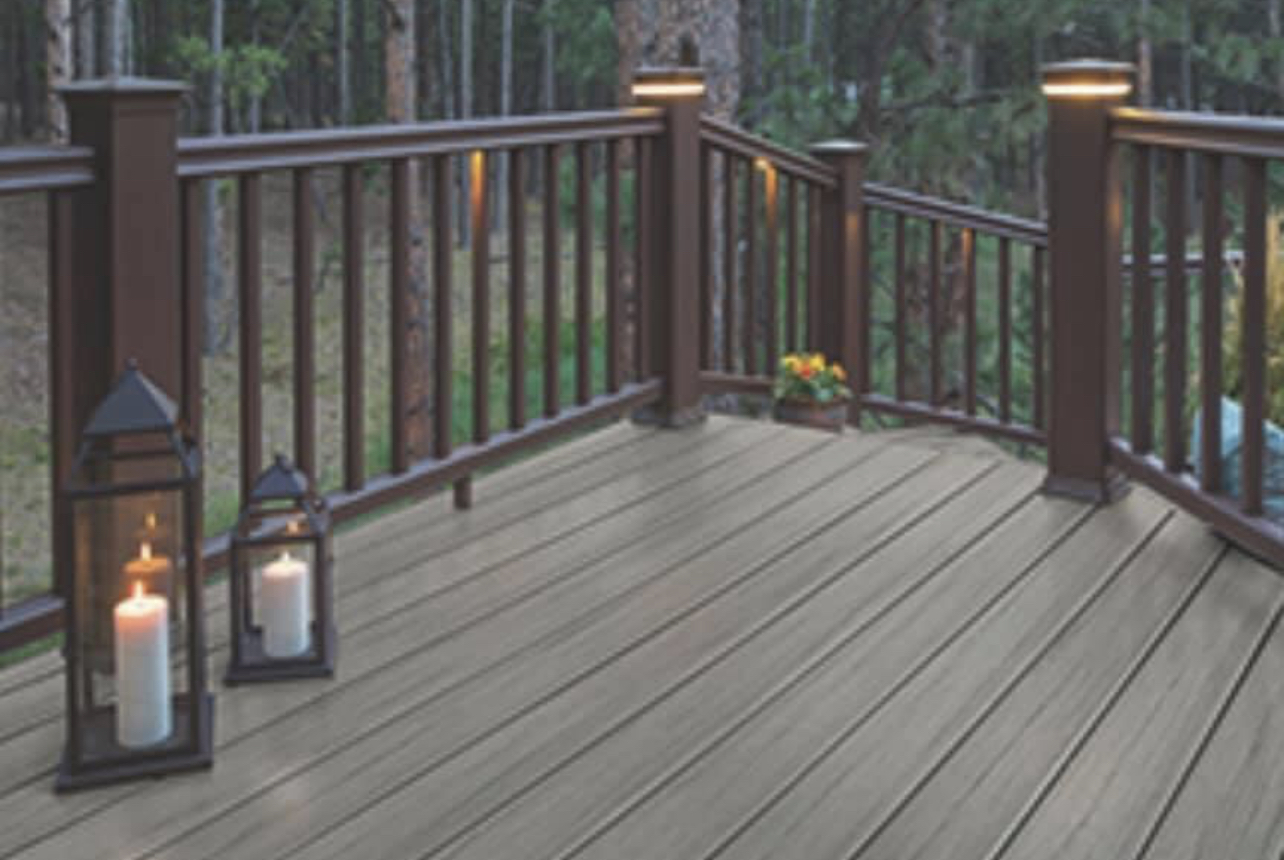
As a reputable deck builder serving the vibrant community of Rock Hill, South Carolina, we understand the importance of choosing the suitable decking material for your dream deck. With the vast array of options that are available, it can be overwhelming to make a decision. That’s why we’re here to guide you through the different types of decks and decking materials, highlighting their advantages and also their disadvantages, so you can create an outdoor space that perfectly suits your needs and preferences.
- Embracing the Classic Charm of Natural Wood Decks:
- Advantages: Natural wood decks, such as cedar, redwood, pressure-treated pine, and tropical hardwoods, offer timeless appeal and rustic beauty that complements the southern charm of Rock Hill. You can find the perfect match for your home’s aesthetics with various wood species.
- Disadvantages: Wood decks require regular maintenance, including staining and sealing, to protect them from the region’s humid climate and potential rot or decay.
- Composite Decks for Effortless Elegance:
- Advantages: Composite decking is popular among Rock Hill residents due to its durability and low-maintenance properties. Made from a blend of wood fibers and recycled plastic, composite decks are resistant to fading, splintering, and insect damage, making them perfect for our area’s hot summers and occasional rain.
- Disadvantages: While the initial cost may be higher than some wood options, the long-term savings on maintenance make composite decks a smart investment.
- PVC Decks: The Ultimate in Weather Resistance:
- Advantages: If you’re seeking a deck that can withstand even the harshest weather conditions, PVC decking is an excellent choice. Impervious to moisture, insects, and rot, PVC decks require minimal upkeep and provide lasting beauty for your outdoor space.
- Disadvantages: PVC decking may offer a different natural look than wood, but the wide range of available colors and textures allows you to find the perfect fit for your style.
- Building with Aluminum for Reliability:
- Advantages: Aluminum decks are a reliable option, especially for those in fire-prone areas. With resistance to rust, rot, and insects, aluminum decks provide a low-maintenance and long-lasting solution.
- Disadvantages: While aluminum decks are durable and safe, they may have limited design options compared to other materials.
- Stone or Concrete Decks for Unparalleled Durability:
- Advantages: Stone or concrete decks are ideal for homeowners seeking a sophisticated, durable outdoor space. These decks can withstand the test of time and provide a luxurious look for elevated decks or rooftop spaces.
- Disadvantages: The installation cost for stone or concrete decks may be higher, but their longevity and beauty make them a worthwhile investment.
- Rubber Decks for Safety and Comfort:
- Advantages: Rubber decks are slip-resistant and offer a soft, comfortable surface, making them perfect for play areas or poolside decks. They come in various colors and patterns, adding a touch of style to your outdoor living space.
- Disadvantages: While rubber decking is an excellent choice for safety, it may have limited design options compared to other materials.
- The Best of Both Worlds: Composite and Wood Hybrid Decks:
- Advantages: Hybrid decks combine the natural beauty of wood with the durability and low-maintenance features of composite materials. They offer a harmonious balance between aesthetics and convenience.
- Disadvantages: Depending on the brand and materials used, hybrid decks may cost more, but they are worth considering for their unique qualities.
- Ipe Decking: Timeless Elegance and Durability:
- Advantages: Ipe, also known as Brazilian Walnut, is a dense, exotic hardwood with a luxurious and sophisticated look. It boasts exceptional durability, resisting rot, decay, insects, and fire. Ipe decking requires minimal maintenance, making it an excellent choice for homeowners seeking a long-lasting and low-maintenance option.
- Disadvantages: The initial cost of ipe decking can be higher than other wood options, but its longevity and premium quality make it a worthwhile investment.
- Cedar Decking: Natural Beauty and Aromatic Charm:
- Advantages: Cedar is a popular choice for its natural beauty and aromatic scent. It is naturally resistant to decay, rot, and insects, making it a durable option for decks. Cedar decking is also lightweight and easy to work with during installation.
- Disadvantages: Cedar requires regular maintenance, including staining and sealing, to preserve its color and protect it from weathering.
- Plastic Decking: Eco-Friendly and Versatile:
- Advantages: Plastic decking, made from recycled materials like high-density polyethylene (HDPE) or polyvinyl chloride (PVC), is an eco-friendly option. It is resistant to rot, decay, insects, and moisture, making it a durable choice for outdoor spaces. Plastic decking comes in various colors and textures, offering versatile design options.
- Disadvantages: Some plastic decking materials may be prone to fading or scratching over time.
- Redwood Decking: Rich Color and Natural Resistance:
- Advantages: Redwood boasts a beautiful reddish-brown hue and contains natural tannins that make it resistant to insects, decay, and rot. It offers an attractive and classic look for decks that complements various architectural styles.
- Disadvantages: Redwood requires regular maintenance to preserve its color and prevent weathering.
- Vinyl Decking: Waterproof and Low Maintenance:
- Advantages: Vinyl decking is a waterproof and low-maintenance option, perfect for homeowners seeking a deck that requires minimal upkeep. It is impervious to moisture, mold, and mildew, making it an excellent choice for humid climates.
- Disadvantages: Some vinyl decking products may have limited color options, and some homeowners may prefer the natural look of wood.
- Pressure Treated Wood Decking: Affordability and Protection:
- Advantages: Pressure-treated wood is an economical choice for decks. It is chemically treated to resist rot, decay, and insects, making it more durable than untreated wood.
- Disadvantages: Pressure-treated wood may require regular maintenance and staining to preserve its appearance and protect it from weathering.
- Teak Decking: Exotic Beauty and Weather Resistance:
- Advantages: Teak is a highly prized tropical hardwood known for its exquisite beauty and natural weather resistance. It contains natural oils that repel water, insects, and decay, making it an excellent choice for outdoor use.
- Disadvantages: Teak is one of the most expensive decking options due to its scarcity and premium qualities.
- Tigerwood Decking: Exotic Appeal and Striking Patterns:
- Advantages: Tigerwood is an exotic hardwood with unique striping patterns that add a touch of elegance and sophistication to decks. It is naturally resistant to decay, insects, and rot.
- Disadvantages: Tigerwood may require periodic maintenance to retain its vibrant colors.
As your trusted deck builder in Rock Hill, South Carolina, we understand that choosing the right decking material is essential for creating a beautiful and functional outdoor space. Each decking material type has advantages and disadvantages, catering to different preferences and budgets. Whether you prefer the classic charm of natural wood, the modern appeal of composite materials, the resilience of PVC or aluminum, the durability of stone or concrete, or the safety of rubber, we are here to guide you in crafting the perfect deck that fits your lifestyle and enhances your home’s appeal. Let us bring your dream deck to life in Rock Hill so that you can enjoy the beauty of outdoor living year-round. Contact us today to embark on this exciting journey of creating your ideal deck!









